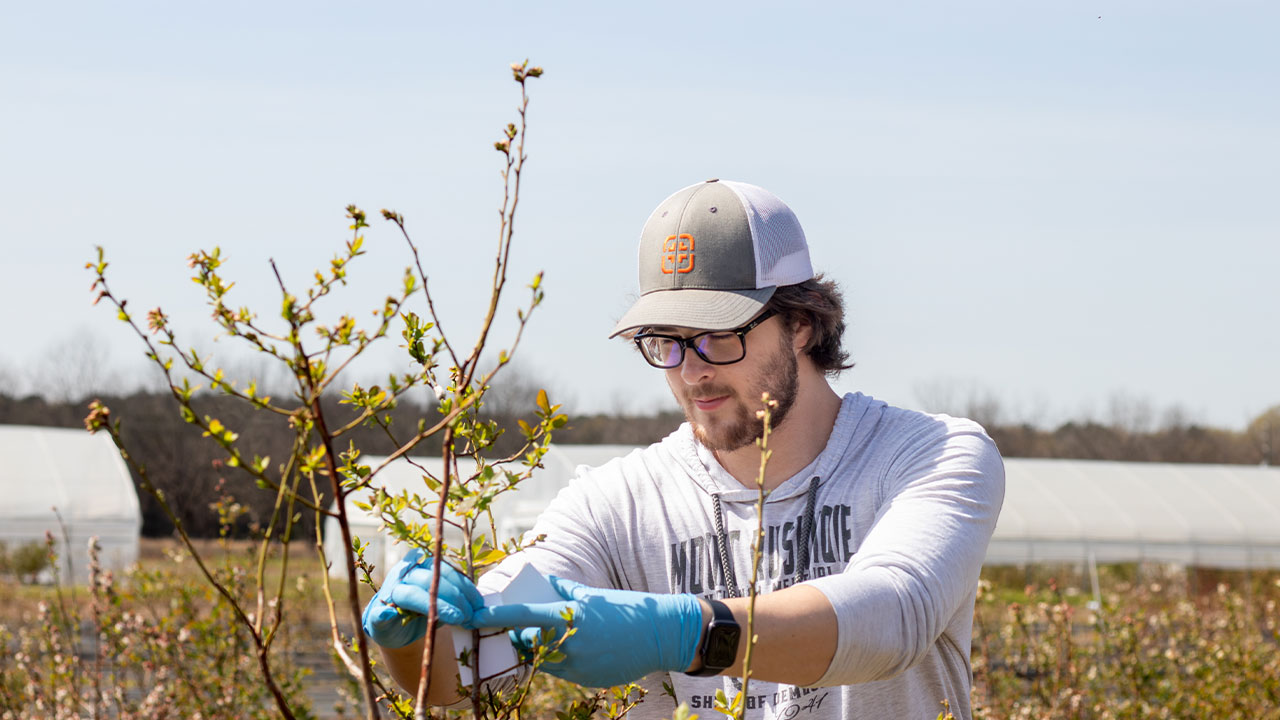content body
Auburn University often adds academic programs in response to workforce demand and societal needs.
One of the latest additions is a major in biological and agricultural technology management. With the acronym BATM, it is colloquially called the “Batman” major.
There is no connection to the famed Caped Crusader of DC Comics. However, if the goal is to produce graduates who use technology to solve problems, perhaps Auburn is creating its own legion of superheroes.
Launched in 2019, the BATM program was designed to meet what Oladiran Fasina, professor and head of the Department of Biosystems Engineering in the College of Agriculture, calls “the workforce need of the future” by addressing the “growing use of technology and automation in all areas of society,” including agriculture, manufacturing and automotive.
Assistant Professor John Linhoss said the major “attracts students who are interested in applying practical problem-solving skills to agricultural and technological challenges.
“The purpose of the program is to produce graduates that apply technology to solve real-world problems through research and coursework in agricultural and biological systems, technology management and applied sciences.”
As the global population is expected to exceed 9 billion in less than 20 years, challenges related to food, water, fuel and energy will only intensify. With the BATM degree, Linhoss and others hope Auburn students “can help solve some of these grand challenges.”

Lighting junction boxes in commercial poultry houses often break over time and are difficult to replace without modifying existing wiring and conduit. In an attempt to solve this issue, BATM students designed, 3D printed and tested several iterations before finding one that worked well. Pictured are students water testing one of the boxes.
The appeal
That bold goal has helped attract students from “all walks of life,” according to Linhoss. While some have backgrounds in agriculture and want to stay in that industry, others are more interested in pursuing careers in technology — but all are drawn to the program’s focus on applying practical skills to real-world problems.
Josh Etherton, a native of Valley, Alabama, tried forestry and civil engineering before BATM was an option. Then, his advisor suggested it based on his interests. Etherton enjoyed the program so much he stayed for a master’s degree and is now a doctoral student and graduate research assistant under Linhoss.
Jacob Sizemore, originally a biosystems engineering major, switched to BATM because of its “unique nature of blending hands-on experience, technology management and agriculture into one degree.”
The program began with 10 students and now enrolls more than 30. More than 20 graduates have secured jobs with companies such as Bonnie Plants, Archer Daniels Midland and Metrolina Greenhouses. Several have continued to graduate school.
“I think BATM is popular among our students who have roots in agriculture but still want to gain experience using technology and solving problems,” said Jon Davis, senior lecturer and undergraduate program coordinator.
With strong workforce demand and a multifaceted curriculum, Fasina expects continued growth. He said plans are underway to expand course offerings and develop graduate and doctoral degree programs.
Be a problem solver
The biological and agricultural technology major in the College of Agriculture is meant to produce graduates who use technology to solve problems.
Learn moreShared purpose
Etherton said BATM was the “perfect choice” for him because he wanted “to become more skilled using technology while learning real-world problem-solving skills.”
After completing an apprenticeship with Linhoss, Etherton knew his next steps. He graduated in 2022 as one of the program’s first graduates, earned a master’s degree in poultry science in 2024 and is now pursuing a doctorate in biosystems engineering.
“I absolutely feel like BATM prepared me for work outside of Auburn,” he said. “It gave me knowledge in subjects such as instrumentation, hydraulics systems, electrical systems and computer aided design. Additionally, the program taught skills like problem solving, project management and teamwork, all extremely important aspects of working in any field.”
Fieldwork, however, isn’t Etherton’s plan. He hopes to stay on campus as an Auburn professor, conducting research and teaching the next generation.
Sizemore, a Rehobeth, Alabama, native, graduated in 2023 and is now a master’s student in biosystems engineering, on track to graduate this fall. His research focuses on testing and validating drones for spreading cover crop seed.
“I want a job that allows me to showcase how beneficial certain combinations of ag technologies can be for producers, while also having the opportunity to install, service and receive feedback on those technologies,” he said.
“The skills and experiences I gained have helped me in both internships and graduate school. BATM is still new, but I’ve seen firsthand how the coursework has grown and improved. The degree is only becoming more impactful.”

Students in the last two Senior Capstone courses developed a Sense and Spray unit that used sensors to detect the presence of a blueberry bush and then uses spray equipment to spray the bush. The project represents a number of topics BATM students learn, including machinery, instrumentation, programming and agricultural technology. Assistant Professor John Linhoss says the unit they created has the potential to save on chemical and water use.




